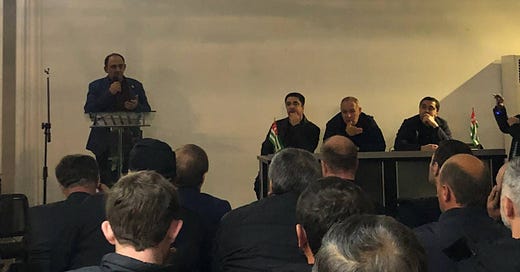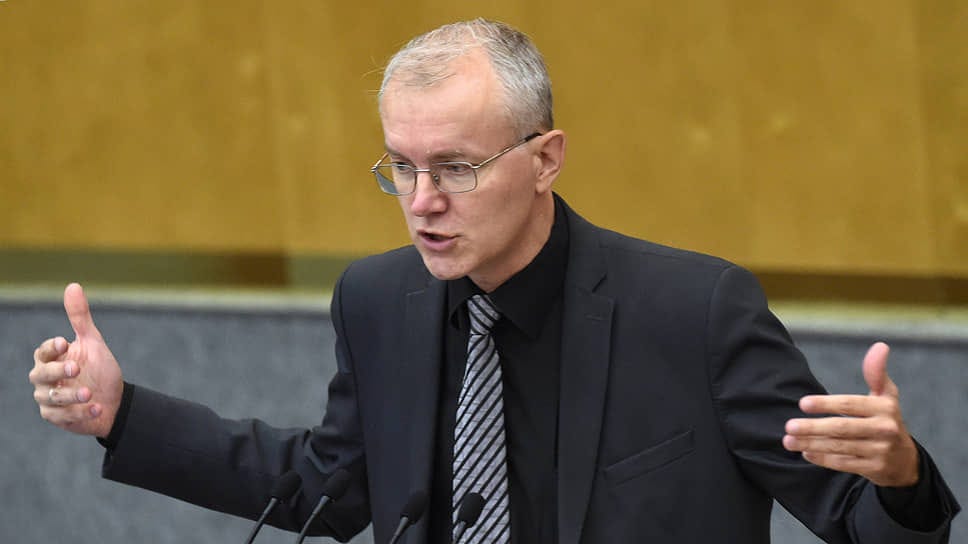Seven Deputies Oppose "Investment Agreement" Ahead of Key Parliamentary Vote
Seven Deputies, Kan Kvarchia, Naur Narmania, Erik Rshtuni, Demur Gogia, Daut Khutaba, Inar Sadzba, and Dmitry Marshan, announced opposition to the "Investment Agreement".
SUKHUM / AQW’A — Seven members of the Abkhazian Parliament have announced their opposition to the contentious "Investment Agreement" ahead of a crucial vote on 15 November. The agreement has sparked widespread debate, with critics claiming it undermines Abkhazia’s sovereignty by granting significant privileges to Russian investors.
A meeting held today at the Atrium Victoria Hotel in Sukhum focused on the agreement. Although all 11 parliamentary representatives from Sukhum and the Sukhum district were invited, only four attended: Kan Kvarchia, Naur Narmania, Erik Rshtuni, and Demur Gogia. These four MPs publicly declared at the meeting that they would vote against the agreement.
Three additional MPs, Daut Khutaba, Inar Sadzba, and Dmitry Marshan, have also voiced their opposition, issuing statements on their social media accounts. Together, the seven deputies form a vocal bloc against the proposal.
The agreement, formally titled the "Agreement between the Government of the Russian Federation and the Government of the Republic of Abkhazia on the Implementation of Investment Projects by Russian Legal Entities in the Territory of the Republic of Abkhazia," has drawn criticism for obligating Abkhazia to approve proposed investment projects, allocate land and infrastructure, and offer substantial tax exemptions. Opponents argue that the terms heavily favour external interests while limiting local control.
Abkhazia’s 35-member Parliament is set to vote on the agreement in a closely watched session. Opposition groups are demanding its withdrawal from consideration and are preparing for mass protests in the lead-up to the vote.
Sergey Markedonov: "Understanding Abkhazia’s Protests Requires Distinguishing Causes from Triggers"
This article by Sergey Markedonov, originally written in Russian and translated into English by AbkhazWorld, examines the recent protests in Abkhazia, exploring their causes, implications, and the complexities of the republic’s relationship with Russia.
On the evening of 11 November, troubling news emerged from Abkhazia: opposition representatives had blocked bridges leading to the republic's capital. The following day, President Aslan Bzhania convened an emergency meeting of the Security Council. Social media, news agencies, and Telegram channels buzzed with speculation about a potential new political crisis in Abkhazia. How serious are these concerns? Could the unrest strain relations between Moscow and Sukhum? Such speculations often arise during protests in the republic, which are far from rare.
Understanding the distinction between causes and triggers is key. Abkhaz authorities and opposition figures offer starkly different explanations. Opposition critics argue that the immediate trigger for the bridge blockades (which were cleared by 12 November) was the detention of five individuals who had attended a public meeting in the Gudauta district. Meanwhile, pro-government voices claim the opposition is acting destructively, inciting public dissatisfaction.
However, the underlying causes run much deeper. Abkhazia faces a difficult dilemma: to embrace greater Russian economic involvement at the risk of increased influence from Moscow, or to continue pursuing "independence" and "uniqueness," risking further stagnation. The republic's struggle for self-determination is complex, and its history frequently echoes in current events. For instance, as recently as the summer of 2024, a law allowing the construction of hotels by Russian entities without land alienation was withdrawn from parliament due to public pressure.
On 7 October, the Abkhaz Parliament discussed an Investment Agreement with Russia. Several deputies opposed the draft, criticising the government for pushing the agreement without sufficient input from the legislative body. Despite this, on 30 October, the Ministry of Economy announced on its website that the agreement had been signed with the Russian government. The project envisions Russian legal entities undertaking investment initiatives in Abkhazia. The document is scheduled for parliamentary review on 15 November, with further debate on its feasibility likely to continue.
Observers unfamiliar with Abkhazian specifics may interpret the protests as anti-Russian sentiment, assuming that any protest signals a "colour revolution" and a geopolitical shift. However, Abkhazia is accustomed to political disputes and heated debates. Leadership changes through protests have occurred multiple times, yet these shifts have never resulted in the republic's "Westernisation."
In late October, the Eurasian Cooperation Development Fund conducted a study titled "Russia-Abkhazia Alliance: Myths and Realities." According to the survey, 93% of respondents view Russia as Abkhazia's main ally. Given the absence of other potential allies ready to recognise the republic or guarantee its security and economic development, such perspectives remain grounded. Freedom of expression and public discourse in Abkhazia should not be conflated with a rejection of its pro-Russian stance.
The author is a senior research fellow at MGIMO and the editor-in-chief of the journal "International Analytics."
Recent protests in Abkhazia have drawn the attention of Russia's political circles. Providing context, Russian social and political activist Oleg Shein, a former left-wing deputy of the State Duma for multiple terms, shares his insights into the underlying causes of the demonstrations. Originally posted on his Telegram account in Russian, his commentary has been translated into English by AW.
Protests in Abkhazia: Causes and Context
Recent unrest in Abkhazia briefly caught the attention of Russia’s political circles. But what are the underlying causes?
Unlike South Ossetia, which is a small valley with a population of around 30,000 seeking closer integration with Russia, Abkhazia is building an independent state founded on principles of military democracy. Leadership positions in the country require knowledge of the Abkhaz language, a language as complex as Chinese, making it challenging for non-Abkhaz ethnic groups, such as Russians and Armenians, to assume top roles.
Since gaining independence, Abkhazia has seen five presidents. While the first two passed away in office (many believe Vladislav Ardzinba was poisoned during negotiations with the Georgians) [Abkhazians generally avoid discussing it, though Ardzinba himself suggested he was poisoned, but not in Tbilisi. Meanwhile, Sergey Bagapsh’s death also raised questions, as he passed away in a Moscow hospital from complications following what was supposed to be a straightforward operation for a smoker’s lung condition. —Ed.], the third resigned following mass protests, and the fourth failed to secure re-election and was forced to step down. Elections in Abkhazia are competitive, and the parliament plays a significant role in governance.
Critics often compare the ruins of Sukhum with the glittering modernity of Batumi in Georgia. However, while Batumi attracted European investments, Abkhazia deliberately kept foreign investors at bay, fearing the loss of sovereignty and becoming a satellite economy like Barbados, where much of the land and industry is owned by foreign businesses and locals serve as the workforce.
The primary point of contention is the "Investment Agreement." This deal centres on attracting large-scale Russian capital capable of investing over 2 billion rubles ($20 Million) in individual projects. To put this in perspective, Abkhazia’s entire budget is 12 billion rubles ($120 Million), with around 5 billion ($50 Million)coming from Russian financial aid.
Under the agreement, Abkhazia would be obligated to approve any proposed investment project, allocate land and infrastructure for it, reimburse 50% of VAT, and waive profit and property taxes for eight years. Investors would also have the right to bring in workers from outside the region, bypassing local labour resources. Initially, the deal included full VAT reimbursement, but Abkhazia managed to negotiate a concession.
The agreement covers all sectors of the economy, including tourism, utilities, energy generation, agriculture, and industrial production, excluding food production.
Furthermore, Abkhazia would not be allowed to introduce new regulations related to environmental standards, architecture, or other requirements that would apply retroactively to existing investment agreements. While the agreement includes provisions for Abkhazia to compensate investors for damages, there is no reciprocal clause holding investors accountable for potential damages.
These conditions have sparked significant concern among Abkhazian citizens, forming the backdrop for the recent wave of protests. Many fear that the agreement undermines Abkhazia’s sovereignty and prioritises external interests over local needs. This is the essence of the discontent driving the demonstrations.
Oleg Shein. https://t.me/oleg_shein/7344






